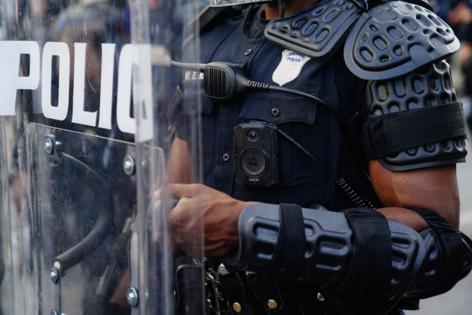Atlanta police are better at using body cameras -- but not always
Published in News & Features
ATLANTA — A new audit of the Atlanta Police Department’s body-worn camera recordings found that police officers have become significantly better at turning on cameras during encounters with civilians since an initial analysis in 2018.
But there are still times when they don’t.
From January through December 2024, 88% of encounters were recorded by officers. That’s a big improvement over an audit of body-camera use from November 2016 to June 2018, which found just 33% of encounters were recorded.
But the new report also found that officers turned their cameras on late or turned them off early about 20% of the time.
“Despite these improvements, we still identified instances where officers turned on cameras late and turned them off too soon, which could either be a mistake or an intentional effort to hide wrongdoing,” the audit says.
Body camera footage provides crucial firsthand accounts of police interactions with citizens and has revealed, in some cases, instances of excessive force and other misconduct.
The city of Atlanta began requiring police to wear body cameras in 2017. Since, such footage has provided up-close looks at controversial cases like the 2020 shooting of Rayshard Brooks in a Wendy’s parking lot and the tasing of two college students amid protests during the same time.
And in 2023, APD footage gave the only insight into a confrontation between a protester of the city’s public safety training center and state law enforcement, which ended with an officer shot and the young environmental activist killed by a state trooper. State law enforcement officers are not required to wear such cameras.
Body camera recordings have also caught APD officers seriously injuring or even sexually assaulting victims while at work, an Atlanta Journal-Constitution investigation found.
Body camera footage captured the 17 minutes APD officers held Ricardo Dorado Jr. down on his stomach before his heart stopped beating in 2022. Police internal affairs suspended two officers for using unnecessary force on Dorado, records show.
The Fulton County District Attorney’s office reviewed the videos and declined to criminally charge the officers.
As of March, more than 1,800 employees in the city’s police department — both sworn and non-sworn — wear body cameras, according to the audit.
Lieutenants and lower ranks are required to wear them, while higher officials like captains, majors, deputy chief, assistant chief and the chief of police can opt in to having one.
On Monday, Atlanta Police Chief Darin Schierbaum called body-worn cameras “the best thing that has happened to American law enforcement” in terms of supporting officers and revealing cases of misconduct.
“Whether you’re a new recruit or a 30-year veteran, the message is the same: Body-worn cameras are your friends,” Schierbaum told the AJC.
“We also use it for accountability, and no officer wants a bad officer working alongside them.”
The city has a 10-year, $97.4 million contract with camera provider Axon that provides Atlanta’s police, fire and corrections departments with a variety of recording devices, according to the audit.
Officers must manually begin recording on their body cameras unless it is auto-activated by an unholstered firearm or emergency lights or sirens within a 30-foot radius.
At the end of their shifts, officers leave their cameras to charge and upload videos to the department’s cloud storage system, which retains recordings for at least five years.
Thaddeus Johnson, an assistant professor of criminal justice and criminology at Georgia State University, agreed with Atlanta’s chief that body cameras have transformed policing by adding another level of scrutiny for the officers who wear them.
“From the citizens’ perspective, they feel like it’s another set of eyes, particularly if you’re from a marginalized community that doesn’t have the best history with police,” he said, noting the bodycam footage acts as “an additional witness.”
Most officers with cameras take a more “by-the-book” approach to interacting with residents, Johnson said. And that may lead to arrests that might have otherwise just been a warning, he said.
Others might feel emboldened to use force in situations because they believe their actions are justified by the recording, said Johnson, who previously worked as a Memphis police captain.
“It can act as a deterrent (of police misconduct), but it’s not a magic bullet,” he said. “Just like anything else, it depends on context.”
-------------
— Staff reporter Shaddi Abusaid contributed to this report.
©2025 The Atlanta Journal-Constitution. Visit at ajc.com. Distributed by Tribune Content Agency, LLC.










Comments